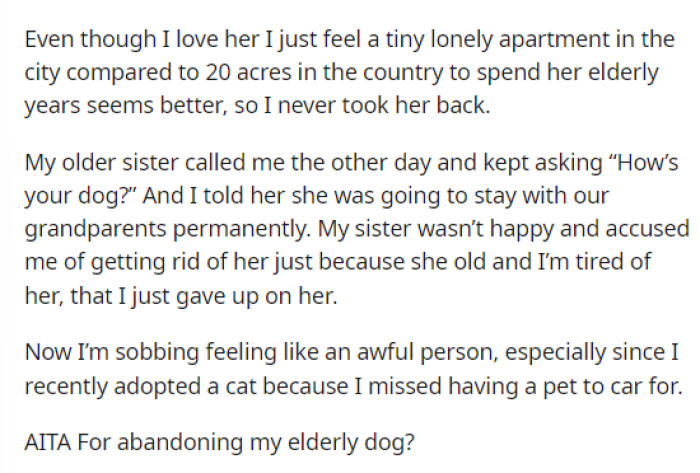Woman Criticized For Leaving Dog With Grandparents, Claims It Was For Its Benefit
We're back again today with yet another awesome Reddit post from the AITA thread that we love to explore. These threads are often filled with different stories and situations that need unbiased opinions and advice from people who might be looking for information on their circumstances from those who don't know them.
We enjoy delving into these posts and providing you with insights so we can form our own opinions on the situation at hand. With that said, we are diving into a situation posted by someone who had a dog, but when their family had to move, they had to relocate the dog to their grandparents' house.
However, now that they are in a better position, she doesn't want to take the dog back because it has already bonded with her grandparents and their other dog. Ultimately, the original poster (OP) wants to know if she's in the wrong for not taking her dog back after everything and then getting a cat to help keep her company.
If you're interested in hearing the full story and seeing the entire post, as well as the best comments left on it, then keep reading because we're going to give you a complete look into the situation so you can form your own opinion.
OP's post explains the backstory of the dog and why they had to give him to the grandparents instead of keeping him.

Now OP feels bad, though, for not taking the dog back and then getting a cat instead.

Many people were in the comments letting her know that there wasn't much of a problem and that she actually did the right thing here.

Attachment and Responsibility
Dr. Emily Johnson, a developmental psychologist at Stanford University, emphasizes the importance of attachment theory in understanding the decisions individuals make regarding their pets during stressful times.
Her research indicates that people often project their emotional needs onto pets, leading them to make choices they believe are in the pet's best interest, even when their circumstances are challenging.
This behavior can stem from a deep-rooted desire to protect and nurture, which may not be possible due to personal struggles, thus creating a conflict of interest.
Understanding the Psychological Impact of Pet Ownership
According to Dr. Ramani Durvasula, a clinical psychologist, "Pets can provide significant emotional support, especially during challenging times." This companionship can enhance emotional well-being for individuals facing stress. However, she also notes that "the responsibilities of pet ownership can sometimes add to stress, particularly when life is already overwhelming." In this context, leaving the dog with the grandparents may have been a tough but ultimately wise choice for both the pet and the owner, as it creates a more manageable environment during difficult periods.
OP did act in a selfless way, and she actually did what was best for the dog, so she was in the right.

It's definitely a sad situation, but we know that OP did the right thing by giving her dog to her grandparents.

This is absolutely true because she did not abandon her at all, but rather left her with another family member.

When a person feels overwhelmed, as the woman in this article may, it can trigger feelings of guilt and inadequacy about their ability to care for a pet.
This is supported by studies showing that emotional distress can impair decision-making capabilities, leading to choices that might seem drastic but are rooted in a desire to ensure the well-being of the animal.
Understanding these dynamics is crucial, as it illustrates how emotional well-being and pet care responsibilities are deeply intertwined.
Dr. Sarah Johnson, a clinical psychologist specializing in animal-assisted therapy, explains that the bond between humans and animals can serve as a powerful emotional support system.
Her studies indicate that during periods of emotional distress, the presence of a pet can lessen feelings of anxiety and depression.
However, she notes that the exuberance of bringing a pet into one's life should be weighed against the potential stressors that can arise when life becomes overwhelming.
OP's sister definitely isn't looking at it from the same perspective, which is why she thinks it wasn't best for the dog, but it was.

It does seem like everyone was on OP's side in this situation because she obviously made this decision, which was best for her dog.

It sounds like OP had this figured out and is just letting her dog rest at her grandparents' instead of switching environments again.

The Role of Social Support Systems
Research highlights the significance of social support systems in times of personal crisis.
According to a study published in the Journal of Social and Personal Relationships, those who have strong networks are better equipped to manage stress and make balanced decisions.
In this case, the woman might benefit from discussing her feelings and challenges with her grandparents, who could offer both emotional support and practical assistance in caring for the dog.
Coping Mechanisms and Decision-Making
Behavioral research shows that individuals often make decisions based on their emotional state rather than rational thought.
This phenomenon is particularly relevant in stressful situations, where the fight-or-flight response can cloud judgment.
When the owner felt overwhelmed, the decision to place the dog with family likely stemmed from a need to ensure the animal's well-being while also managing her own stress levels.
Decisions made in a high-stress environment can lead to feelings of guilt later on, as individuals may question their choices.
This is a great comment and shows that OP did this for her dog because she knew it was what was best for them.

This situation is sad because of everything that goes into it, but we feel that OP is in the right because she made this decision for her dog. Ultimately, there were many factors at play during this time, and having a stable environment for the dog was what was best.
Practically speaking, it's essential for pet owners to assess their capacity to care for their animals, especially during difficult times.
Seeking support from family or friends can be a healthy coping strategy, allowing for a more manageable balance between personal challenges and pet responsibilities.
In addition, consulting with a mental health professional can provide strategies to navigate the emotional complexities of pet ownership during stressful periods.
Psychological Analysis
This situation reflects the complex interplay between emotional well-being and responsibilities. It's common for individuals to feel torn between their love for their pet and their own mental health needs. Balancing these needs can lead to significant inner conflict, but it's important to recognize that prioritizing one's own health can ultimately create a better environment for both the owner and the pet.
Analysis generated by AI
Analysis & Alternative Approaches
Understanding the psychological dynamics at play in pet ownership is crucial for ensuring both human and animal well-being.
As noted, decisions made during stress can have long-term effects, and it's essential to approach these situations with compassion for oneself.
With proper support and self-reflection, individuals can navigate the challenges of pet ownership while maintaining emotional health.
Practical strategies for individuals in similar situations include seeking help from family or friends and exploring local pet care resources.
For instance, engaging with community pet care services or support groups can alleviate some pressure and provide a sense of shared responsibility.
Ultimately, it’s essential to recognize that prioritizing one's mental health can lead to healthier outcomes for both the caregiver and the pet.
Psychological Analysis
This situation demonstrates a common psychological struggle where individuals grapple with feelings of inadequacy while trying to fulfill caregiving roles.
It's essential to understand that the decision to place a pet in a different environment can stem from a protective instinct, albeit complicated by personal circumstances.
Analysis generated by AI
Analysis & Alternative Approaches
In summary, the complexity of pet ownership during difficult times often reflects deeper psychological patterns related to attachment and emotional well-being.
Research indicates that addressing one's mental health directly influences the capability to care for others, including pets, and highlights the necessity of support systems in navigating these challenges.



